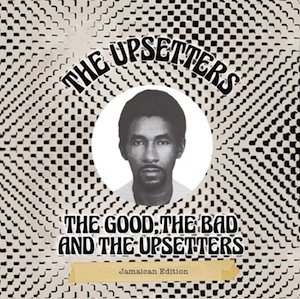Lee "Scratch" Perry is widely recognised as being one of the most significant musical innovators of his time, a force majeure in terms of influence and scope. There seems hardly a musician alive that hasn’t, at some point or another, cited the man’s work as being a touchstone in their own. A key figure in the development of dub, his recordings stand as an essential lesson in the possibility of the producer as more than just studio tea-maker.
With all that in mind, there is little question that this, a record of reggae instrumentals from his ad-hoc studio session band the Upsetters, will be of interest to some. Perhaps then, the question should be how much it will be of interest to all. For some-one coming new to Perry’s work, it isn’t the best of introductions. The Good, The Bad And The Upsetters was released in 1971 as response to the appearance of an LP bearing the same name, recorded by Perry’s touring band with a different producer in the UK. Perry, upset that the LP had been put out without his permission, decided to release his own record, albeit in a limited run in Jamaica.
This reissue, put out by Hot Milk Records, is the first time the album has been widely available, and it shows Perry’s dub production values in an embryonic form. The building blocks are there, from the inception of the uncanny organ on ‘Same Thing All Over’ to the bubble of bass that drives ‘Equalizer’, though the mixes lack the space and reliance on echo of Perry’s later work in his home studio, the Black Ark.
The songs are dense demonstrations of the competency of Perry’s musicians, and give an indication of Perry’s ability to draw out the best in those he worked with. ‘It’s Alright’ feels like the greatest instrumental the Beastie Boys never recorded. There are some indications of the Perry’s eccentricity also, for instance the knee jerk rhythm section of ‘Dracula’ contrasted against its over-bearing fart of an organ line. Elsewhere, the inclusion of two versions of songs by the Wailers remind the listener of the crucial role Perry played in laying out the sonic template for his contemporaries.
For those with a passing interest in Perry or just starting out, the matter of whether this record is an essential purchase will be questionable. There are certainly better places to start, with such comprehensive reissues as the Arkology anthology and the Trojan three disc Upsetter box-set available. David Katz, the writer of the excellent Perry biography People Funny Boy, provides a set of linear notes for the reissue that strike a balance between the contextual and reverent.
They serve to highlight the late-60s and early-70s phase of Perry’s career as being the foundation for what came, and it is in that spirit that the Good, The Bad And The Upsetters should be approached. Perhaps not the most innovative thing to ever have emerged from Perry, but the album is a pleasing demonstration of the early studio craft of the self-proclaimed Upsetter.


